
NECTAR & TWIGGY
6. LEINSTER
"Ladies and gentlemen," the Aer Lingus captain announced. "Would you kindly fasten your seat belts? We are approaching Dublin and expecting a little turbulence!"
The Boeing 737 - according to TP McLean - 'jumped, bounced and positively groaned', the cabin creaking as the plane dropped its landing gear, preparing for arrival at Dublin Airport.
Pole Whiting, a detester of all forms of air travel, got paler by the minute. Grizz, Toby and Sully, were rudely awakened from their slumber.
The captain - who would later be referred to by the team as 'Biggles' - seemed to approach the runway at 'a hopelessly excessive speed', then more crashed than touched down, with an almighty thud, at around 200 knots.
The All Black party watched apprehensively through the porthole windows and out into the murky dusk, with spume rising from the wheels of the plane and red lights flashing and fast approaching. The plane eventually screeched to a halt just 50 feet from the end of the runway.
A rather seedy bunch of rugby players disembarked. It had little to do with hangovers and everything to do with the violent flight across the Irish Sea. Moose Whiting, for one, was not keen to relive the experience.
Only 29 of the AB's had been aboard the flight. Trevor Morris remained in London to receive specialist treatment on his injured leg from physiotherapist, Malcolm Hollins, an expert in sporting injuries. It was 'critical point' for Trevor. Had Hollins not been able to repair his leg, he would have been on his way home and a replacement called for.
It wasn't the left leg calf muscle he'd pulled in the match against the New York Allstars that was causing him concern. He'd taken a kick with his right leg at training and felt a pain behind the shin. Had Hollins not been able to detect the unusual nerve injury, it would have kept the Nelson Bays fullback out of all rugby for a further twelve months.
TP, on that first night in Dublin, having survived the plane trip, caught up with the great Ray McLaughlin, veteran of two Lions tours to New Zealand and over 30 caps for Ireland. The renowned master tactician had relayed to TP, that he thought the AB's had some deficiencies in their choice of lock forwards. Wilson Whineray had mentioned the same thing, the night before the touring party left Auckland.
McLaughlin had also speculated on the pack as a whole, and wondered how many of this current crop would get into the legendary pack of 1964, who had struggled themselves to defeat Ireland by just 6-5. His rationale was that Kirky may make it. Wyllie was mentioned, more as a 'reserve/emergency' in the modern game.
Ironically, it was Grizz who - while not the captain - stood up as a leader and got the AB's home in the match against Leinster.
***************
Match 08: Lansdowne Road, Dublin, Ireland. November 15th, 1972
Leinster 9, New Zealand All Blacks 17 (Half-time: 0-3)
For NZL: Wyllie T. Skudder T, P Whiting T. Williams P. Going C
For Leinster: Ensor P
Leinster: Tony Ensor (Wanderers), Tom Grace (St. Mary's), Kevin Flynn (Wanderers), Paul Andreucetti (St. Mary's), Alan Duggan (Lansdowne), Mike Quinn (Lansdowne), John Moloney (St. Mary's), Willie Duggan (Blackrock), Fergus Slattery (Blackrock)(r: Paul Inglis, 12'), Conleth Feighery (University College Dublin), Kevin Mays (University College Dublin), John Craig (Lansdowne), Noel Dwyer (University College Dublin), Dave Barry (Wanderers), Sean Lynch (St. Mary's)(c).
New Zealand: Sid Going (c), Bryan Williams, Duncan Hales, Mark Sayers, George Skudder, Ian Stevens, Lin Colling, Bevan Holmes, Alistair Scown, Peter Whiting, Ian Eliason, Alex Wyllie, Kent Lambert, Ron Ulrich, Graham Whiting.
Weather: Fine. Ground: Firm. Crowd: 25,000. Referee: M. Joseph (Wales)
Penalties: LEI 12, NZL 9. Line-outs: NZL 16, LEI 6. Rucks: NZL 10, LEI 5. Tight-heads: Urlich 2, Barry 0
"There was a firm belief held by British and Irish rugby writers, that the All Blacks would do well to survive against Leinster at Lansdowne Road, as their spirit and determination (call it celtic fire), would disturb the tourists."
JBG Thomas, The Avenging All Blacks, 1973.
And as would become a staple with virtually every game the AB's played, the British Press coined them 'lucky', forever putting in below par performances and seemingly escaping with victory at the last. It must have been infuriating for the men of Fleet Street, that in the end, the team - out of 32 matches played on tour - were beaten on just five occasions (one of those being the International against France).
But from the time they arrived in England in late October - Western Counties and Cambridge University aside, although even Counties were fancied to win before their game commenced - they came up against seriously committed outfits in Llanelli, Cardiff and London Counties. The two Irish provinces of Leinster and Ulster were likely to continue that trend.
'71 Lions, Sean Lynch and Fergus Slattery were 'steamed up' at the thought of renewing old acquaintances. Other international players in the Leinster lineup included Michael Kevin Flynn (20 March 1939 – 16 January 2022), who first represented Ireland in 1959. Alan Duggan was first capped against the 1963 All Blacks and played 25 internationals for his country, the swansong being a victory against France in April, scoring a try (dotting down 11 times in his career in emerald green).
John Moloney had been capped three times during the 1972 Five Nations Championship and he (along with Grace, Flynn, Slattery and Mays) would also play for Ireland against the AB's on January 20th, 1973. Moloney would play for Ireland until 1980, gaining 27 caps. Tom Grace was twice capped during the same Five Nations Championship as Moloney, playing 25 times for his country until 1978.
Tony Ensor (22, 1973-1978) and Mike Quinn (10, 1973-1981) would play for Ireland in the future along with William Patrick Duggan (1950-2017) (41, 1975-1984), the backrower from Blackrock also touring New Zealand with the 1977 Lions and playing in all four test matches. Paul Andreucetti toured Australia in 1979 with the Irish team (not required for the tests), which also included Moloney and Willie Duggan.
The AB team named for the Leinster match was always going to lack cohesion, the selectors naming a side chiefly in order to give certain players - Kirky, Keefy and Clock particularly - a well earned rest. With Trevor Morris still unavailable through his injury, three half-backs were named in the starting line-up; Lin Colling at scrum half, Nectar at fly half and Milt (captain for the day) at fullback.
An 80% fit George Skudder would play on the left wing, his first match in the UK. Duncan Hales was playing his first tour game as a centre, Stevens only his second as fly half. In the pack, Bevan Holmes, Ian Eliason, Kent Lambert and Graham Whiting were strictly 'dirt-trackers'.
Fourteen minutes from the end, the selectors were probably wishing they hadn't selected such a makeshift, mid-week combination against the inter-provincial champion of Ireland. Bill (later Wiile) Duggan, future British Lion, but then just 18 months out of junior football, stormed over for a try from a line-out, which once converted by Tony Ensor, saw Leinster ahead by 9-7.
The All Blacks were having one of their 'sixes and sevens' days, according to TP. The 'dirt-trackers' were in trouble from the start, with the committed Leinster pack fired up for the big challenge and - captained by Lynch - predictably ripped into the New Zealanders from the outset.
Milt Going kicked off into the wind and the ball failed to travel the required 10 metres. At the first scrum of the match, he showed up at the base of it, waiting for John Moloney, the incumbent Irish scrum half, to feed, before remembering he was playing fullback. Moments later, his first attempt to find touch failed. The first time he entered the backline he dropped the pass.
Leinster were not without worries of their own. Fergus Slattery, was concussed in the 12th minute, attempting to tackle Nectar and left the field, blood streaming from his face. There was a suggestion from another Leinster player after the match that he had been kicked by Alistair Scown, which Rugby News editor, Bob Howitt, refuted; "Scowny' is not that sort of player".
From his own comments made after the match, Slattery made it clear that he considered it himself, to have been an 'aimed blow'.
The Leinster boys were fully aware of George Skudder's unfortunate plight also, and had instructions to run the ball out to their international winger, Tom Grace, to test his hamstring out. Early in the match, taking into account that it was George's first match in the UK, Grace looked much too good for the beleaguered kiwi.
"George Skudder's thigh," Joe Karam had stated, while stubbing out a cigarette, at the teams hotel in Dublin, "was as black as this ashtray is green."
The pothole he stepped in at Brockton Point Oval in Vancouver, tore the muscles in his thigh, up to the groin and were damaged almost beyond repair. There'd been signs of internal bleeding. It had been nearly a month since that match and George had become quite depressed after arriving in London, when he was made aware that he faced the prospect of prolonged medical treatment for his injury.
It did not help at all, that his rival for a wing berth in the forthcoming internationals, young Batts Batty, had immediately soared into early-tour form. Both George Skudder and Trevor Morris, by the time of the Leinster match, were very seriously on the heading home list, given that their injuries had already been given some considerable time to heal.
The first time Tom Grace ran at Skudder, his left thigh strapped to the hilt, he made a brave tackle, despite being described by TP as 'looking like a broken down old pug'. A dog came onto the field and Bee Gee picked it up and carried it right across to the sideline. Bee Gee, Milt and Leinster fullback, Tony Ensor, all missed kickable penalties.
In the loose the home side produced much of their best work. The Irishmen hunted as a pack and ripped into the rucks and mauls. Willie Duggan was not the slightest bit intimidated by the heavier and taller opponents with whom he was mixing it. In a few scrummages they had pushed so effectively that the All Blacks front row had been ignominiously lifted. On one occasion, Noel Dwyer lifted Kent Lambert clean out of the scrum and Lynch was giving Moose a torrid time.
The AB's were trying. Colling ran, Twig attempted a few midfield breaks and Duncan Hales put a kick through for Bee Gee which was just out of his grasp. Nectar made had a couple of darting runs, Milt Going too. Ron Urlich was penalised for 'striking too soon', but Tony Ensor's penalty attempt had more of a golf slice look about it. Going too, missed with two penalty chances, hooked and falling short.
'Super Sid' made one telling break up the middle, but as had been feared, when the ball reached George Skudder, no matter how energetic his movement looked, his leg's simply wouldn't carry him. Bryan Williams, from 27 metres out, successfully raised the flags in the 33rd minute.
Legs Eliason, who was having a great game, especially at #3 in the line-out, conceded a penalty, but Ensor was again astray. The All Blacks went to the break, just the miserable three points ahead. The score was largely against the run of play. Leinster had played rousingly and the AB's were struggling to keep a grip on the lively, fiery home pack.
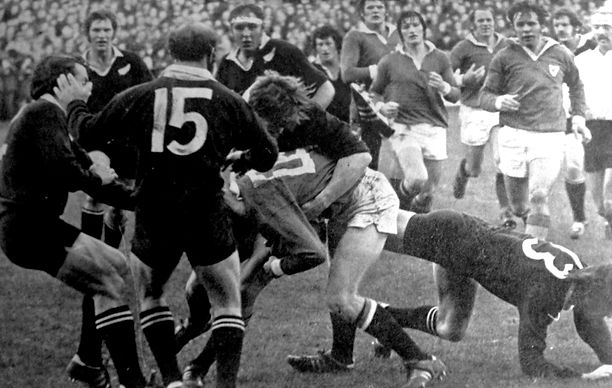
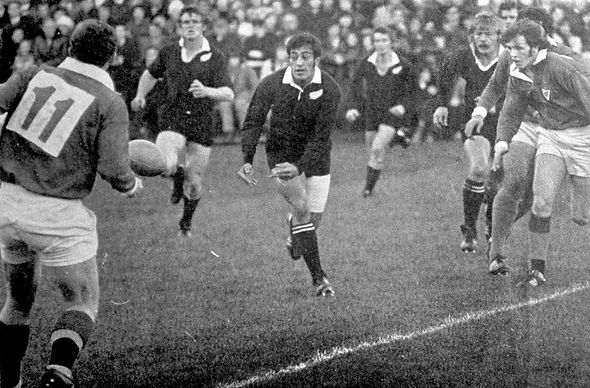
Nectar & Twiggy in action against Leinster at Lansdowne Road in Dublin. (Left) Twig (13) takes a tumble as Scowny wraps up an unidentified Leinster back. Milt and Duncan Hales are on hand, with Holmes, Eliason and Lambert steaming up the centre. (Right) George Skudder about to receive a pass, with Nectar closest in support. Scowny and Lin Colling are the other AB's.
At the break, the All Blacks discovered why Grizz was so highly regarded as the captain of Canterbury. He wasn't down in the programme as captain, but with Milt not able to contribute much by the way of battle plans from the fullback position, he just took command. His halftime team talk was one of an exceptional leader, balling the team out and demanding more.
And following a 44th minute equaliser, a successful penalty by Ensor from 27 metres (after Scown had been penalised for 'shoving' at the rear of the line-out), it was Grizz again who showed his class and thundered across for a try to break the 3-3 deadlock. The All Blacks had been made to work hard for their lone try to that point, 22 minutes into the second half.
It followed an intense passage of play where no fewer than 10 scrums were packed down in less than 10 minutes, five each, within touching distance of the others goal line. The intensity appeared to have taken its toll more on the home side than the visitors, and the damn burst when Bevan Holmes detached from the scrum and moved blindside. Colling took a pass from him and fed the rampaging Wyllie, who stormed through to score. Bee Gee missed the conversion. All Blacks 7-3.
Four minutes later however, the home side had their moment of glory and one that gave them and the Lansdowne Road faithful, both hope and belief that they could beat these All Blacks. The posthumous roar of the crowd could be heard almost 3km away in O'Connell Street. And for Nectar, it's probably the one moment of the tour that he'd want to forget!
The call for a line-out, within metres of the All Blacks line, was short and fast to Moose Whiting at No. 2, then a drive up the touchline by the forwards. Whether missed communication or otherwise, George Skudders throw went in like a rocket, bounced off Mooses shoulder and into a space - on or just over the goal line - between Nectar and the young giant, Willie Duggan.
Stevens paused, or life just went into slow motion for him. Duggan took full advantage and scored. Ensor converted and the Leinstermen led by 9-7, with just 18 minutes to go. The crowd were fever pitched, smelt blood and Lansdowne Road became a cauldron. But once again, in the physical absence of Kirky - and metaphysical of Milt - it was Grizz who stood up and demanded still more from the so called mid-weeker's.
In an effort to give some solidarity to the creaking NZ vanguard, he moved himself to the back of the scrum and Holmes took his place on the blindside. By taking control of the scrummage situation, Wyllie had ordered the grinding down of the home resistance, which, for the first time that afternoon, was looking brittle, despite being still ahead on the scoreboard.
In the 71st minute, with the clock ticking, Lin Colling broke from the base of a scrum on his own 10 metre line and kicked ahead. There was hesitation between both Leinster wingers, Grace and Alan Duggan, when attempting to cover defend. Having crossed each others bows, they collided and the ball fell free.
Colling retrieved his own kick and quickly despatched a pass to the Twig, who moved blind, drew Tony Ensor in and found the unmarked George at full stretch. With a timely, if not fractionally delayed offload, he sent the galloping Skudder away down the left hand touchline and in at the corner, inches away from the corner flag and just evading the desperate lunge of Tom Grace. George's face was a picture of unbounded joy, as he headed back to halfway.
_edited.jpg)
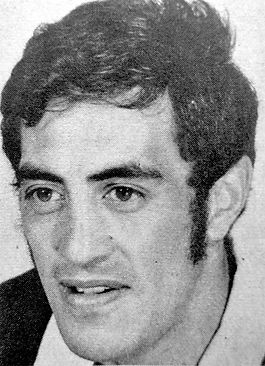
Playing in just his first match of the UK/Ireland leg of the tour, following an horrific hamstring injury, the Waikato's only tourist 72/73 All Black, George Skudder, scores his try against Leinster, his opposite, Tom Grace, too late to prevent the score.
The New Zealand backline also felt the release of the pressure valve, having come under so much criticism for their alleged lack of enterprise and adventure. Only really in the tour opener against Western Counties had they really put all the flair and talent that they collectively possessed into points. Batts aside, who was taking his chances and finishing, like a centre forward in football.
The midfield were all 'green horns' at international level, only a handful of test caps between them. Finding the right combinations was therefore still on a trial and error basis and there was little time to resolve the issues and find answers before the Welsh test, just two and a half weeks away.
Everyone had an opinion, including myself, an almost nine year old boy. Brian O'Brien, editor of The Sports Digest, had the one which most resembled my own, so one which I endorsed. In an editorial he wrote, entitled 'The All Black backline needs a leader', he suggested that; "Mark Sayers could be the man and given the chance, he could emerge as the thinking player, with sound principles on how to run a backline."
Twig was often credited as being the brains behind the Wellington backline resurgence, which rose, like the Phoenix, from the ashes and cinders of the '71 Lions mauling. Ex-All Black, Grahame Thorne, was a big fan. He had played outside Sayers in the 1968 inter-island fixture in Christchurch, where four of the six tries scored by the North Island, were three-quarters, fed by the Sayers.
"I am particularly happy with the selection of Mark 'Twig' Sayers in the All Black team. I have always regarded him as a great player and when I played with him, we had lots of laughs and played some fine rugby. He is a natural footballer."
Grahame Thorne, Sports Digest, January, 1972.
"Should Sayers be given any influence on the activities of the back line, I am certain that Williams, Batty, Skudder and Hales, will receive their fill of good ball...assuming that it is delivered to the backline in sufficient quantity, at the right time."
Brian O'Brien, editorial Sports Digest, January, 1972.
Three minutes after Skudder had scored, New Zealand made the game safe with a third try, this time scored by Pole Whiting. 'Super' Sid fielded a clearing kick on the halfway line, made as if he were about to attempt a pot at goal, then sent a soaring punt into orbit. Tony Ensor misjudged the bounce, right under his goal posts. Pole, 'screaming through like an express train', gathered the loose ball and steamrolled across for the try. Going converted and the All Blacks were home by the skin of their chattering teeth.
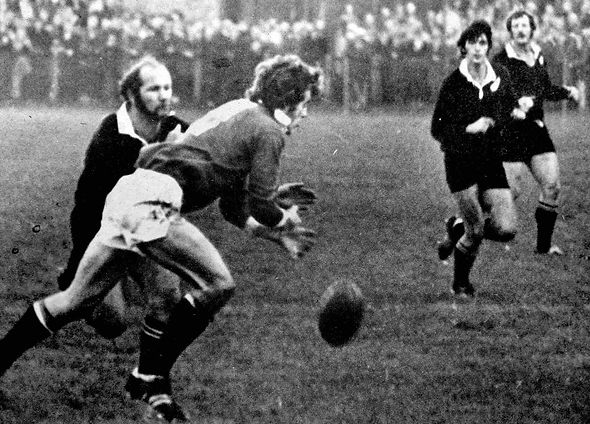
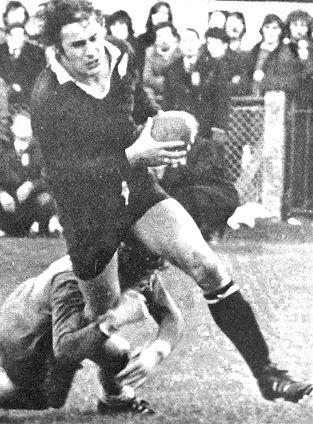
Tony Ensor fumbles Milt's up-and-under (Twig and Grizz awaiting advancement) and seconds later, Pole Whiting has claimed the pill and is in for the try.
The All Black scrummaging, already under the Cosh, was found to be in a neo-embarrassing state and in serious need of being tightened up. Too often Leinster had been able to shove the All Blacks back on their own heel, spoiling any possession gained, which gave Lin Colling a torrid time. Bob Howitt was particularly ruthless, but most New Zealand journalists had something sinister to say about the All Blacks performance - and/or the shape of the team in general - and seemed wholly prepared to stick the knife in.
"Scown and Holmes, among the loose-forwards, were wanting in wit and application. Stevens tried his darndest to look like an international first five-eighth, but mostly failed, and everywhere there was a naive, undisciplined look about the team. Except for Wyllie, who valiantly tried to stir some life into the ship that nearly sunk, by taking over the leadership."
Bob Howitt, Rugby New Tour Book 2, 1973
In the following days, TP received word from none other than the great AB full back, Bob Scott, who was not impressed with a crack the journo had made regarding Nectar's effort to move toward the ball sooner, when Willie Duggan bagged his four pointer. Bob was defending his Petone club cohort, but TP, admitting his analysis was cruel, felt his comment was justified; "One could not be sure whether 'Nectar' was paralysed from the waist down, or the neck up."
Ahead of the match against Leinster, Ernie Todd and Ian Kirkpatrick speak to RTÉ Sport (Irish National Television). The episode of ‘Sports Final’ was broadcast on 12th November, 1972. The presenter was Fred Cogley.